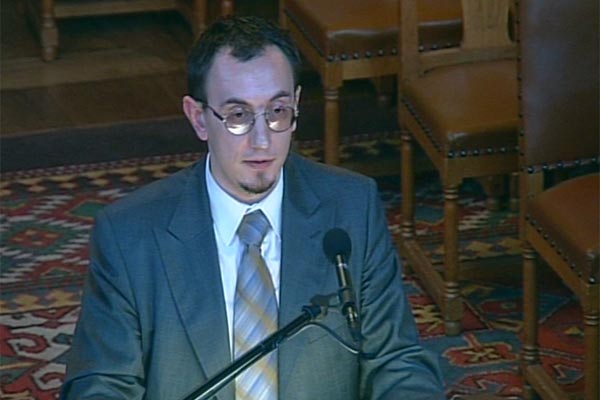Home
DEFENSE, MILOSEVIC-STYLE
In their efforts to challenge the allegations made by the BH party on Belgrade's responsibility for the crimes committed by the Red Berets, Arkan’s men, Seselj’s men and Scorpions, SaM representatives use arguments used by Milosevic in his trial before the ICTY to defend himself against the same charges
 Vladimir Cvetkovic, deputy to the chief representative of Serbia and Monte Negro
Vladimir Cvetkovic, deputy to the chief representative of Serbia and Monte Negro At the hearing before the International Court of Justice, Belgrade’s legal representatives do not deny that the paramilitaries from Serbia committed some of the worst atrocities in BH, but they do deny the existence of any ties with the Serbian State Security Service, claiming that the crimes – no matter how grave –were not at a scale sufficient to be qualified as genocide.
In his efforts to challenge the allegations made by the BH party on Belgrade's responsibility for the crimes committed by the Red Berets, Arkan’s men, Seselj’s men and Scorpions, Vladimir Cvetkovic, SaM’s co-agent, mostly used the same arguments Milosevic had used in his trial before the ICTY to defend himself against the same charges.
Just as Milosevic before him, Cvetkovic claimed today that the Red Berets were a “myth” created in the war in Croatia which then spread to BH. Quoting Captain Dragan and noting that he had testified as a prosecution witness at the Milosevic trial, Cvetkovic claimed that many of the “local units” in Croatia and BH had worn “red berets”, considering themselves “special, rather than regular units”.
Again following in Milosevic’s footsteps, Cvetkovic went on to say that the Special Operations Unit (JSO) was established only in 1996, not in 1991, as its erstwhile commander Franko Simatovic had said at the famous ceremony in Kula. Footage of the ceremony had been shown in court at the ICTY. The JSO was part of the State Security Service, itself part of the Serbian Interior Ministry.
Cvetkovic quoted Captain Dragan again, describing Frenki’s words as “exaggeration and bragging”.
To prove that Arkan’s Serbian Volunteer Guard didn’t have anything to do with the Serbian State Security Service, Cvetkovic quoted from the testimony of Arkan's former secretary. When she was cross-examined by Milosevic, she said the Tigers had not had “Serbian State Security ID cards”.
Cvetkovic then quoted from Vojislav Seselj’s testimony at the Milosevic trial. The Serbian Radical leader amended his previous statements about the Serbian Interior Ministry arming his volunteers – the Chetniks. At the trial he claimed that he got the former Serbian president and his interior minister “involved” in the efforts to arm the Chetniks for “reasons of political propaganda, to provoke them”. Cvetkovic allows that Seselj may have lied in court, but he notes that Seselj “may also have lied when he made the statements” about the weapons he got from the Serbian Interior Ministry.
As for the documents originating from the Republika Srpska Interior Ministry, stating that in the summer of 1995 the Scorpions were dispatched to the Sarajevo area as a “Serbian Interior Ministry unit”, Cvetkovic claims their “authenticity is doubtful” – as did Milosevic. But, he went on to say, “even if they are authentic, the documents do not prove anything but the fact that some officials from the Republika Srpska Interior Ministry thought that the Scorpions were part of the Serbian Interior Ministry”.
All in all, Cvetkovic concluded, at the beginning of the war in BH, the paramilitaries from Serbia “operated independently or under the control of the local Bosnian Serb authorities that had invited them”, for instance, as Biljana Plavsic invited Arkan to Bijeljina. Then, in the summer of 1992, the paramilitaries were put under the control of the Republika Srpska military or police. On the rare occasions when such units crossed over the Serbian-BH border after 1992 (e.g., in operations Pauk and Treskavica), they were under the command of the local authorities (e.g., Fikret Abdic), or were subordinate to the Republika Srpska military or police. Their crimes thus could not be laid at the door of the Serbian State Security Service or the Belgrade authorities.
Furthermore, Cvetkovic added, those crimes – no matter how grave they are – were not at a scale sufficient to be qualified as genocide. According to him, the indictments issued by the ICTY against Arkan, Seselj, Stanisic and Simatovic confirm this argument. The four of them are charged with all the crimes committed by the paramilitaries in BH. Those crimes are qualified “merely” as crimes against humanity, grave breaches of the Geneva Conventions and violations of laws and customs of war, not as genocide.
